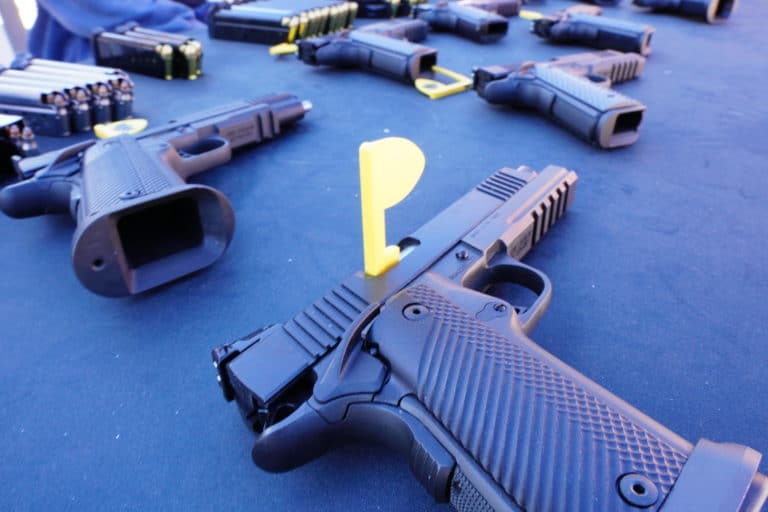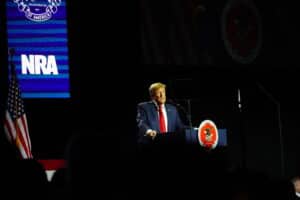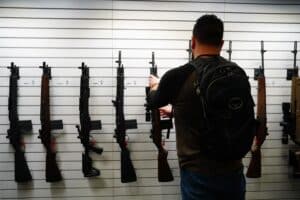Only one in a hundred Americans list guns as their top priority just a few weeks out from the midterm elections.
That’s a significant decline from what The New York Times found in the aftermath of the Uvalde shooting this summer. YouGov’s two most recent polls put the number closer to five percent but saw a similar decline in interest. Given the advantage Democrats held among those listing it as their top issue, the decline of the gun issue coupled with the rise of economic issues Americans favor Republicans on could prove politically significant.
And it’s not just polling signaling sliding interest in gun politics. You can see it in the midterm ads too. Groups on both sides of the gun debate have diversified their messaging to include issues beyond gun policy.
But why is that decline happening in the first place?
We’re only a few months removed from some of the biggest gun news events in American history. The horror of the attack on Robb Elementary captured the nation’s attention in May. It led directly to a bipartisan bill that imposed the first new federal gun restrictions in decades back in June. On top of that, the Supreme Court handed down the landmark decision in New York State Rifle & Pistol Association v. Bruen recognizing a right to gun carry.
Some of the decline follows the typical pattern seen after a high-profile mass shooting. Initially, interest in and support for stricter gun laws tends to increase significantly. But, as time passes, that interest wains. The new normal after the spike may still end up higher than before the cycle started, which is still a significant long-term problem for gun-rights advocates, but a plateau and decrease is typical.
This time around, there was some variation to the norm. Americans’ support for an “assault weapons” ban, the top priority for many elected Democrats, actually fell after Uvalde. But, more importantly, the federal government passed a gun-control bill.
Senate minority leader Mitch McConnell (R., Ky.) publicly admitted part of the reason 17 Republican senators supported the bill was the calculation it would remove guns as a potential midterm election.
“We’ve lost ground in suburban areas. We pretty much own rural and small-town America. And I think this is a sensible solution to the problem before us, which is school safety and mental health,” McConnell told Politico of the decision in June. “I hope it will be viewed favorably by voters in the suburbs that we need to regain in order to hopefully be in the majority next year.”
It seems that idea did add up. The bipartisan bill did something. Whether that something was good policy that will prevent future attacks is still up for debate. But it appears to have hastened the downside of the trend even though Democrats attempted to extend the issue’s relevance by passing the first assault weapons ban through the House in a generation.
The failure of that bill to move at all in the Senate and the likely long-term impact of the Bruen ruling may also be tempering interest from gun owners who feel more at ease over the threat of new gun bans. Plus, as quickly as Bruen has started to affect the lower levels of the federal court system, the ruling hasn’t yet produced a substantial nationwide impact. Its influence on how the average American thinks about the elections is likely pretty limited at this point.
Ultimately, pocketbook issues are top of mind. Given the state of the economy and inflation, it’s not surprising. Even at their peak, guns never surpassed economic issues as Americans’ top priority.
Still, that doesn’t mean the NRA or Everytown should give up on running ads or trying to turn out their voters.
After all, gun politics are rarely the top issue in a midterm election. Guns can still be a decisive factor because of how intensely a substantial number of voters care about the issue, even if they don’t list it as their top priority. So, while gun politics may not have the same broad-level salience they did earlier this summer, that doesn’t mean they won’t be decisive in some of the closer races.







One Response
I have noticed a pattern where the media drives public opinion based on the headlines and stories they choose to run. For instance, the Dallas hospital shooting didn’t even make it as a story in Newsweek…like, at all. And, there is not a single story about guns in Newsweek right now. Three weeks ago they were talking about the Supreme Court decision. The propaganda campaigns of anti-gun rights have also shifted their spending to use other issues, such as abortion, to get votes for the Democrats, which they know will be more sympathetic to gun control.
Here’s another tactic Newsweek seems to be using: Push headlines to the top of the page about the war in Ukraine, and the evil of Putin, and those who are supposedly sympathetic to Russia. Right now the top headlines are: Story about a Serial Killer, story about “Democrats chances of beating GOP to hold Senate with Two Weeks Left”, and Trump Slams Jan 6 Committee at Rally and Xi Jinping and more Putin.
In my view it’s psy-ops propaganda that is pushing a Democratic Agenda. They are keeping their powder dry on gun control.